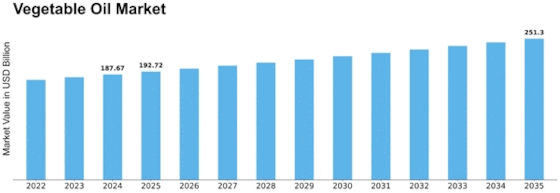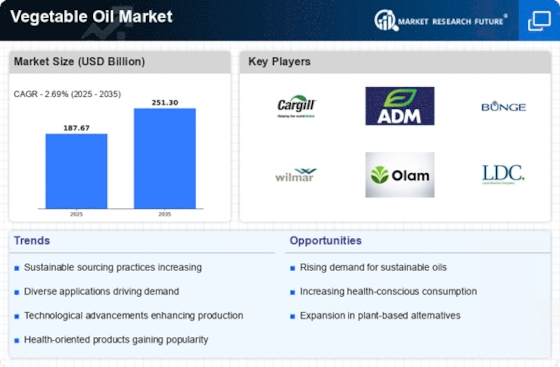Vegetable Oil Size
Vegetable Oil Market Growth Projections and Opportunities
Numerous variables interact to form the dynamics of the vegetable oil market, which in turn reacts to customer preferences, economic situations, and worldwide trends. The agricultural landscape and oilseed cultivation are two important factors. The availability of crops like canola, soybeans, palm, sunflower, and rice has a direct effect on how much vegetable oil is produced. The market as a whole is impacted by weather patterns, pest management strategies, and agricultural technological developments that are critical to maintaining a steady and adequate supply of raw materials. The dietary trends and consumer tastes have a major role in the market variables of the vegetable oil sector. Demand for oils thought to be more heart-healthy—like olive oil—has increased as people prioritize leading healthier lives. Furthermore, there is a growing market for oils with less saturated fat as a result of the move away from trans fats. Vegetable oils are essential components of many processed foods and are thus widely used in cooking and food preparation, making them a mainstay in contemporary diets. Key variables of the vegetable oil market include economic factors at the regional and global levels. Vegetable oil prices are affected by fluctuations in commodity prices, which are impacted by trade regulations, currency rates, and geopolitical events. These fluctuations also have an effect on production costs. Consumer expenditure on edible oils is also influenced by economic stability, income levels, and purchasing power; during economic downturns, consumer behavior may shift in favor of less expensive products. The industrial structure and competitive environment play a crucial role in determining the vegetable oil market. The sector is characterized by the coexistence of regional and global firms. Companies spend in R&D for product innovation due to intense competition, concentrating on aspects like flavor, nutritional content, and packaging. Leaders in the industry frequently get into strategic alliances and acquisitions to bolster their market positions and diversify their product lines.



















Leave a Comment